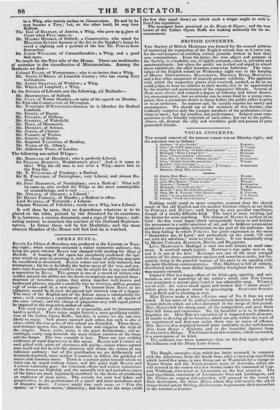OPERA BUFFA.
Ricas La Chiara di Rosenberg was produced at the Lyceum on Tues- day night ; when curiosity attracted a rather numerous audience, this being the piece whence BALFE was charged with stealing his Siege of Rochelle. A bearing of the opera has completely confirmed the opi- nion which we gave on perusing it, and the charge of pilfering may now be considered as dismissed. BALFE comes out not only innocent, but triumphant ; for his is decidedly the better opera of the two, and con- tains some beauties which would in vain be sought for in any (so-called) c Imposition by Rasa. This person is one of a crowd of writers who neither possess the ability nor the desire to originate any musical ideas : destitute of inventive genius, they string together well-known and hackneyed phrases, expand a quadrille into an overture, adding quantum suj: of noise—and lo, a new opera! To borrow from Ricci or his compeers, would be to steal the pieced and tattered. coat of a beggar. The story of the English and of the Italian opera is substantially the same ; each contains a repetition of phrases common to all operas of the saw school ; and the charge of plagiarism may with equal justice be imputed to the respective author of either. The vocal corps of this theatre is respectable, and its instrumental band is perfect. Their union might furnish a most gratifying exhibi- tion of the Italian Opera Buffa : but this, it seems, we are not very likely to enjoy. New pieces succeed each other, but each is alter et idem—while the true gems of this school are discarded. These drum- and-trumpet operas, too, deprave the taste and vulgarize the style of the singers. Noise, noise, noise, is the great desideratum ; and ac- cordingly, every song demands the most violent exertion of the lungs and the throat. The true cantabile is lost. There are two striking evidences of vocal degeneracy in this opera. Bsasts arid CATONE are each gifted with voices of sweetness and purity—voices whose natural tone could not fail to win the attention and charm the senses of any judicious auditory : but of this gratification we are deliberately and
wantonly deprived, since neither is content to follow the guidance of nature and common sense. There is a certain point beyond which no voice can be urged without injury, and this point both Bsasis and CATONE habitually pass : the vehement efforts and violent contortions of the former are frightful, and the naturally rich and melodious tones of the latter are most injuriously sacrificed to the desire of producing an explosion of mere noise. The remedy for such bad habits and propensities, is the performance of a purer and more melodious style
of dramatic music. CATONE might sing such songs as " Pria die spunti," or" II wio tesoro," admirably ; and these are the songs (with
the few that equal them) on which such a singer ought to seek to found his reputation.
The managers have promised us Le Nozze di Figaro ; and the true lovers of the Italian Opera Buffa are looking anxiously for its an- nouncement.


























 Previous page
Previous page